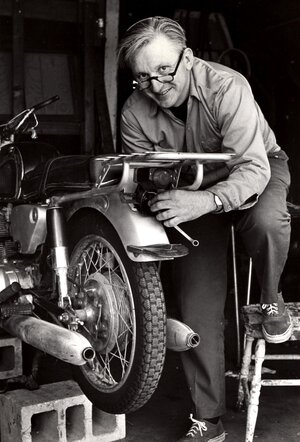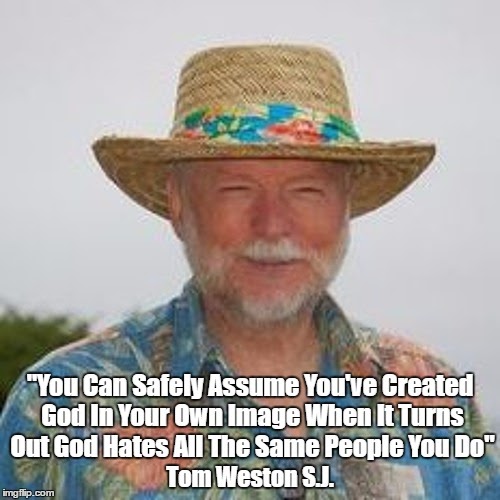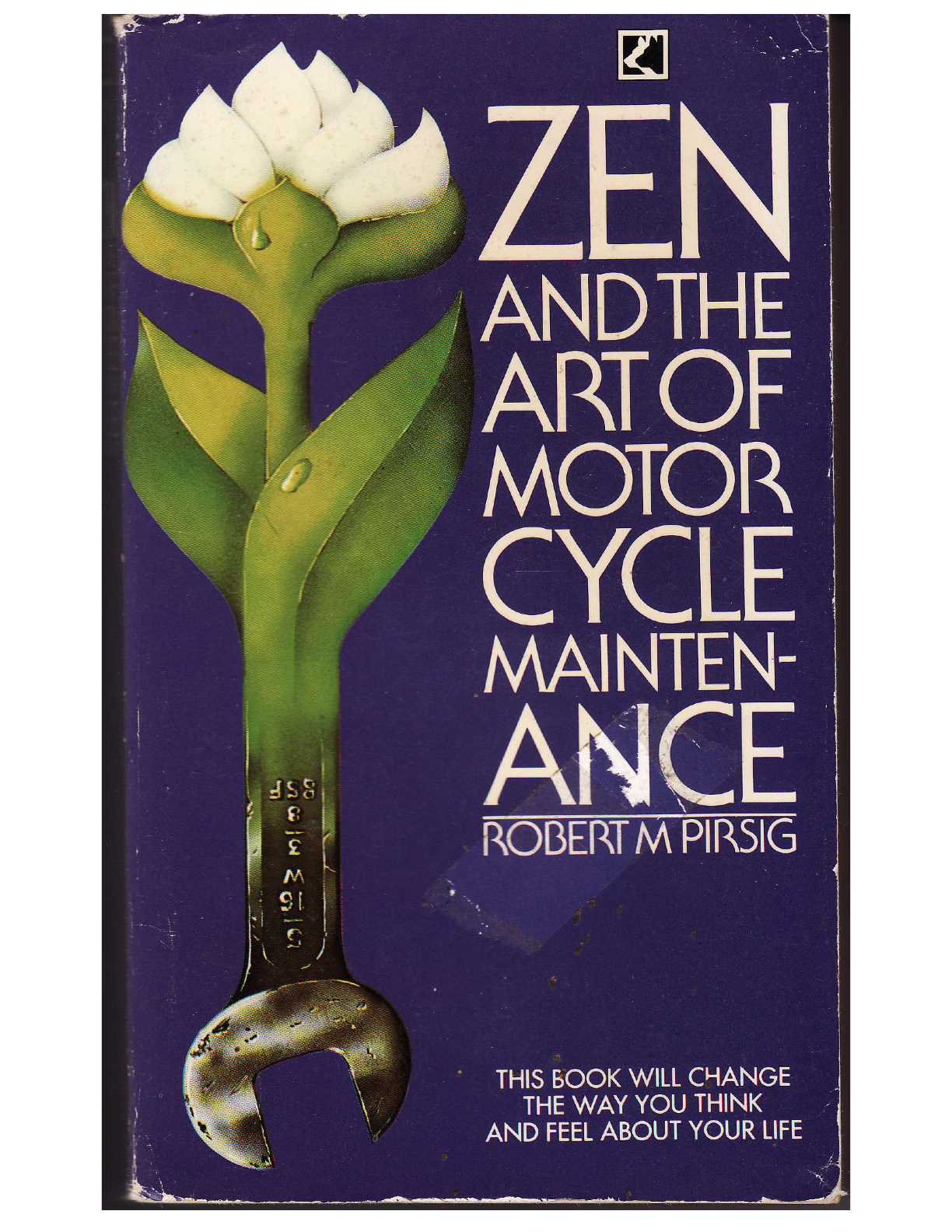
Robert M. Pirsig, whose “Zen and the Art of Motorcycle Maintenance,” a dense and discursive novel of ideas, became an unlikely publishing phenomenon in the mid-1970s and a touchstone in the waning days of the counterculture, died on Monday at his home in South Berwick, Me. He was 88.
His publisher, William Morrow, announced his death, saying his health had been failing. He had been living in Maine for the last 30 years.
Mr. Pirsig was a college writing instructor and freelance technical writer when the novel — its full title was “Zen and the Art of Motorcycle Maintenance: An Inquiry Into Values” — was published in 1974 to critical acclaim and explosive popularity, selling a million copies in its first year and several million more since. (A first novel, it would be followed by only one more, the less successful “Lila: An Inquiry Into Morals,” a kind of sequel, in 1991.)
The novel, with its peculiar but intriguing title, ranged widely in its concerns, contemplating the relationship of humans and machines, madness and the roots of culture.
Todd Gitlin, a sociologist and the author of books about the counterculture, said that “Zen and the Art of Motorcycle Maintenance,” in seeking to reconcile humanism with technological progress, had been perfectly timed for a generation weary of the ’60s revolt against a soulless high-tech world dominated by a corporate and military-industrial order.
“There is such a thing as a zeitgeist, and I believe the book was popular because there were a lot of people who wanted a reconciliation — even if they didn’t know what they were looking for,” Mr. Gitlin said in 2013 in an interview for this obituary. “Pirsig provided a kind of soft landing from the euphoric stratosphere of the late ’60s into the real world of adult life.”
Mr. Pirsig’s plunge into the grand philosophical questions of Western culture remained near the top of the best-seller lists for a decade and helped define the post-hippie 1970s landscape as resoundingly, some critics have said, as Carlos Castaneda’s “The Teachings of Don Juan” helped define the 1960s.
Where “Don Juan” pursued enlightenment in hallucinogenic experience, “Zen” argued for its equal availability in the brain-racking rigors of Reason with a capital R. Years after its publication, it continues to be invoked by famous people when asked to name a book that affected them most deeply — among them the former professional basketball player Phil Jackson, the actors William Shatner and Tim Allen, and the Turkish novelist Orhan Pamuk, a Nobel laureate.

Pirsig: "My personal feeling is that this is how any further improvement of the world will be done: by individuals making Quality decisions and that's all. God, I don't want to have any more enthusiasm for big programs full of social planning for big masses of people that leave individual Quality out. These can be left alone for a while. There's a place for them but they've got to be built on a foundation of Quality within the individuals involved. We've had that individual Quality in the past, exploited it as a natural resource without knowing it, and now it's just about depleted. Everyone's just about out of gumption. And I think it's about time to return to the rebuilding of this American resource—individual worth. There are political reactionaries who've been saying something close to this for years. I'm not one of them, but to the extent they're talking about real individual worth and not just an excuse for giving more money to the rich, they're right. We do need a return to individual integrity, self-reliance and old-fashioned gumption. We really do."
Alan: Most successful conservatives, benefitting from an unacknowledged cascade of synergizing advantages, hunker down in their pleasure domes, demanding that the disadvantaged "make it on their own" - that they "pull themselves up by their bootstraps" - that they are not entitled to a "hand out" even though many hands reached out to them on their typically cosy path to success (or at least what they call success.)
Pseudo-Success And The Undoing Of America
If "the disadvantaged" -- from pre-school onward -- were similarly advantaged by "hand-outs" providing high-quality academic, artistic and experiential opportunities, maligned n'er-do-wells would often outstrip the putative "success" of those conservatives whom John Kenneth Galbraith "nails" and whose current apotheosis is The Deplorable One himself:

"The Hard, Central Truth Of Contemporary Conservatism"

Here's what the right kind of "free lunch" yields:
Brilliant "State Of Things" Interview With UNC Professor Who Has Transformed 3rd World Lives
http://paxonbothhouses.blogspot.com/2017/04/brilliant-state-of-things-interview.html
Brilliant "State Of Things" Interview With UNC Professor Who Has Transformed 3rd World Lives
http://paxonbothhouses.blogspot.com/2017/04/brilliant-state-of-things-interview.html
Part road-trip novel, part treatise, part open letter to a younger generation, “Zen and the Art of Motorcycle Maintenance” unfolds as a fictionalized account of a cross-country motorcycle trip that Mr. Pirsig took in 1968 with his 11-year-old son, Christopher, and two friends.
The narrative alternates between travelogue-like accounts of their 17 days on the road, from the Pirsigs’ home in Minnesota to the Pacific Coast, and long interior monologues that he calls his “Chautauquas,” after the open-air educational meetings at Lake Chautauqua, N.Y., popular with self-improvers since the 19th century.
Chautauqua
Mr. Pirsig’s narrator (his barely disguised stand-in) focuses on what he sees as two profound schisms. The first lay in the 1960s culture war, in which the “hippies” rejected industrialization and the technological values that had been embraced by the “straight” mainstream society.
The second schism is in the narrator’s own mind, as he struggles in his hyperrational way to understand his recent mental breakdown. Mr. Pirsig, who was told he had schizophrenia in the early 1960s, said that writing the book was partly an effort to make peace with himself after two years of hospital treatments, including electric shock therapy, and the turmoil that he, his wife and children suffered as a result.
Describing both breakdowns, cultural and personal, Mr. Pirsig’s narrator invokes the Civil War: “Two worlds growingly alienated and hateful toward each other, with everyone wondering if it will always be this way, a house divided against itself.”
He adds: “What I’m trying to do here is put it all together. It’s so big. That’s why I seem to wander sometimes.”
(Mr. Pirsig’s son Chris was later also found to be mentally ill and institutionalized. He died in 1979 after being stabbed in a mugging outside the San Francisco Zen center where he had been living.)
In a foreword to the book, Mr. Pirsig told readers that despite its title, “Zen and the Art of Motorcycle Maintenance” should “in no way be associated with that great body of factual information relating to orthodox Zen Buddhist practice.”
He added, “It’s not very factual on motorcycles either.”
Instead, he wrote later: “The motorcycle is mainly a mental phenomenon. People who have never worked with steel have trouble seeing this.”
He added, “A study of the art of motorcycle maintenance is really a miniature study of the art of rationality itself.”
The literary critic George Steiner, writing in The New Yorker, described the book as “a profound, if somewhat clunky, articulation of the postwar American experience” and pronounced it worthy of comparison to “Moby-Dick” as an original American work. The New York Times critic Christopher Lehmann-Haupt, in his review, threw in a comparison to Thoreau. In London, The Times Literary Supplement called the book “disturbing, deeply moving, full of insights.”
One of Mr. Pirsig’s central ideas is that so-called ordinary experience and so-called transcendent experience are actually one and the same — and that Westerners only imagine them as separate realms because Plato, Aristotle and other early philosophers came to believe that they were.(Not all reviewers were wowed. Writing in Commentary, Eva Hoffman found Mr. Pirsig’s ruminations obtuse. “Beneath the complexity of disorganization,” she said, “the picture of society which the book presents and the panaceas it offers are distressingly naïve.”)
But Plato and Aristotle were wrong, Mr. Pirsig said. Worse, the mind-body dualism, soldered into Western consciousness by the Greeks, fomented a kind of civil war of the mind — stripping rationality of its spiritual underpinnings and spirituality of its reason, and casting each into false conflict with the other.
Pierre Teilhard de Chardin SJ: "Research As Adoration"
Alan: While I agree with Pirsig that "time" and "eternity," "spirit" and "matter" merge in the world known by our senses, I also believe (without any perceived need to proselytize) that The Divine Milieu in which we are embedded is the dwelling place of a God necessarily beyond imagination, a God I revere as the Magnum Mysterium.
However, for this Great Mystery to be both great and enduringly mysterious, I must "make room" for the possibility that god is immanent and transcendant.
As friend Paul Schulte said nearly fifty years ago, "It's not either/or. It's both/and."
However, for this Great Mystery to be both great and enduringly mysterious, I must "make room" for the possibility that god is immanent and transcendant.
As friend Paul Schulte said nearly fifty years ago, "It's not either/or. It's both/and."
We limit God at our peril.
I have come to believe that all presumed limitations - and absolutely self-certain definitions - are open invitations to the horrifying "wrong side" of Pascal's dictum and Jesuit Tom Weston's insight.

Blaise Pascal

Tom Weston S.J. Best Thing Ever Said By A Jesuit
In his part gnomic, part mechanic’s style, Mr. Pirsig’s narrator declares that the real world is a seamless continuum of the material and metaphysical.
“The Buddha, the Godhead,” he writes, “resides quite as comfortably in the circuits of a digital computer or the gears of a cycle transmission as he does at the top of a mountain or in the petals of a flower.”
Robert Maynard Pirsig was born in Minneapolis on Sept. 6, 1928, to Harriet and Maynard Pirsig. His father was a law professor and dean of the University of Minnesota Law School. As a child, Robert spoke with a stammer and had trouble making friends; though highly intelligent (his I.Q. was said to be 170), he was expelled from the University of Minnesota because of failing grades.
Serving in the Army before the start of the Korean War, he visited Japan on a leave and became interested in Zen Buddhism, and remained an adherent throughout his life. After his Army service, he returned to the university and received bachelor’s and master’s degrees in journalism.
He later studied philosophy at the University of Chicago and at Banaras Hindu University in India and taught writing at Montana State University in Bozeman and the University of Illinois at Chicago. He also did freelance writing and editing for corporate publications and technical magazines, including the first generation of computer journals.
His first marriage, to Nancy Ann James, ended in divorce. He married Wendy Kimball in 1978. She survives him, as do a son, Ted; a daughter, Nell Peiken; and three grandchildren.
Mr. Pirsig maintained that 121 publishing houses rejected “Zen” before William Morrow accepted it. He was granted a $3,000 advance, but an editor cautioned him against hoping the book would earn a penny more. Within months of its release, it had sold 50,000 copies.
With the book’s success Mr. Pirsig became famous, wealthy and the recipient of a Guggenheim fellowship. He also, he said, became thoroughly unnerved. After enduring a flood of interviews, he began refusing them. He said he had reached the limits of his patience when fans started showing up at his house outside Minneapolis.
His neighbors called them “Pirsig’s Pilgrims.” Most were young people in search of a guru. Mr. Pirsig wanted none of it.
“One morning I just woke up at 3,” he told The Washington Post years later. “I told my wife, ‘I just have to get out of here.’ We had the camper packed in half an hour, and I was on the road.” He stayed away for months at a time, sometimes far out at sea on his boat.
In interviews, he lamented that he was not embraced by academic philosophy departments, and that his books were sometimes lumped with “new age” publications in bookstores.
The near-cult popularity of “Zen,” though, puzzled him for years before he came up with a theory. Writing in an afterword to the 10th-anniversary edition in 1984, he used a Swedish word (it was his mother’s native language) to describe the phenomenon. “Zen and the Art of Motorcycle Maintenance,” he wrote, was a “kulturbarer,” or culture-bearer.
A culture-bearing book is not necessarily a great book, he said. It does not change the culture. It simply heralds a change already underway. “Uncle Tom’s Cabin,” an indictment of slavery published before the Civil War, was a culture-bearing book, he said.
“I was just telling my own story,” he said in a short interview posted on his website. He had never intended to make a splash.
“I expressed what I thought were my prime thoughts,” he added, “and they turned out to be the prime thoughts of everybody else.”

Alan: "Fitness" has long been my measure of "the good," at least insofar as I perceive "the good" in my own life.
When moved by "the good," we feel aligned and harmonic.

"We Are Not Punished For Our Sins
I do not limit fitness to the kind of mechanical "fit" embodied by penis and vagina, lingam and yoni.
That said -- and as The Song of Song exemplifies -- the sexual metaphor may be the best figure of speech for how holy/wholly fitness feels. https://en.wikipedia.org/wiki/Song_of_Songs
Fitness, when not limited to our loins -- the fitness that aspires after "universal fitness of body/soul/heart/mind/psyche" -- supposes immeasurably more than the mechanics of biological coupling.
In unrealizable theory, such fitness supposes everything.
In unrealizable theory, such fitness supposes everything.
For fitness to be spirited (and by extension spiritual), it must be felt as "fit" over time - and over space - and will take into account every inter-related set, subset and superset within our field of consciousness.
It takes longer to describe this ramifying sequence of events than it takes for the crystalization of joy to reveal it, but "everything" starts with actions (and inactions) that engender the feeling that right here... and right now... everything is working together - that it is all right.
Julian of Norwich


No comments:
Post a Comment